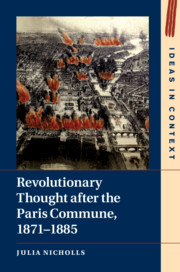Book contents
- Revolutionary Thought after the Paris Commune, 1871–1885
- Ideas in Context
- Revolutionary Thought after the Paris Commune, 1871–1885
- Copyright page
- Contents
- Acknowledgements
- Introduction
- Part I The Paris Commune and Accounting for Failure
- Part II Revolution and the Republic
- Chapter 3 The French Revolutionary Tradition
- Chapter 4 Rehabilitating Revolution
- Part III Marx, Marxism, and International Socialism
- Part IV Empire and Internationalism
- Conclusion
- Bibliography
- Index
- Ideas in Context
Chapter 3 - The French Revolutionary Tradition
from Part II - Revolution and the Republic
Published online by Cambridge University Press: 12 July 2019
- Revolutionary Thought after the Paris Commune, 1871–1885
- Ideas in Context
- Revolutionary Thought after the Paris Commune, 1871–1885
- Copyright page
- Contents
- Acknowledgements
- Introduction
- Part I The Paris Commune and Accounting for Failure
- Part II Revolution and the Republic
- Chapter 3 The French Revolutionary Tradition
- Chapter 4 Rehabilitating Revolution
- Part III Marx, Marxism, and International Socialism
- Part IV Empire and Internationalism
- Conclusion
- Bibliography
- Index
- Ideas in Context
Summary
This chapter calls into question a widely held historiographical perception that the failure of the Commune marked the end of a French revolutionary tradition inaugurated by the Revolution of 1789 and perpetuated by the Revolutions of 1830 and 1848. It reassesses the contexts in which the word ‘revolution’ was used and shows that this dominant interpretation conflicts with the actual writings of ex-Communards on the subject. Activists referred frequently to the events of the recent revolutionary past, but these references were not indicative of the desire to create a static and prescriptive ‘French revolutionary tradition’. Revolutionaries were preoccupied with placing events since 1789 within a longer and broader French genealogy in order to define revolution as a social movement rather than a political event. This was partly a response to moderate Republican efforts to claim and historicise the French Revolution after 1871, but was not solely a product of circumstances. Using the work of Louis Auguste Blanqui, I demonstrate that neutrality regarding the Revolution (1789 and the more radical 1793) had been an element of revolutionary thought since the 1850s. Consequently, I also suggest that the intellectual differences between revolutionaries and more moderate republicans during this period have been overstated.
Keywords
- Type
- Chapter
- Information
- Revolutionary Thought after the Paris Commune, 1871–1885 , pp. 81 - 111Publisher: Cambridge University PressPrint publication year: 2019

